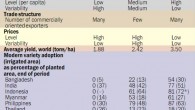Discussion of the system of rice intensification (SRI) is unfortunate because it implies SRI merits serious consideration. SRI does not deserve such attention. A multinational team has shown from both theoretical evaluations and a number of experimental tests that SRI offers no yield advantage. Significantly, these results by Sheehy et al. were published in Field Crops...
Tag Archives: green revolution
The system of rice intensification (SRI) was developed in Madagascar 20 years ago by Fr. Henri de Laulanié of the Society of Jesus after 2 decades of working with farmers to raise their rice production without depending on external inputs. Today, SRI is gaining acceptance around the world. Practiced only in Madagascar until 1999, it has since demonstrated its environmentally...















